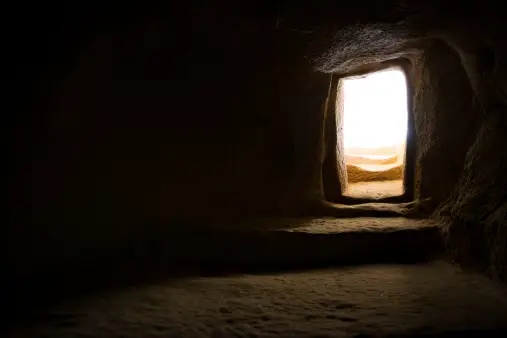This year, Easter coincided with multiple deaths in The Dale community. The result for me has been a real wrestling with resurrection. In the Christian faith, we celebrate that Jesus died and then came back to life. There is promise in this that we too will ultimately overcome death, but for now we still have to stare it in the face. Three friends, in the span of mere weeks, are gone from here arguably too soon. Resurrection seems very far off.
Death is an experience, as the band Mumford and Sons sings, that is so “full”. There is no mistaking that the person is gone, and yet it doesn’t make any sense. Clinging to a future hope while managing the reality of now can be hard work. It has me exploring the word “resurrection”, and delving deep into the story of Jesus, wondering again about what it all means.
The origin of the word resurrection means “to stand” or “to rise up”. Some dictionaries define it as: “the act of bringing something that had disappeared or ended back into use or existence”. This actually brings to mind the ways that I have seen forms of resurrection. Like when a tree buds in the spring, or a broken relationship is restored, or sobriety is found, or a family is reunited, or health returns after an illness.
In Scripture, all of the post-resurrection appearances of Jesus center on the physical. Jesus didn’t speak with a loud voice from the sky, He instead showed up with hands, feet, and scars. He embraced Mary, made footprints on the road with people, chewed on a piece of fish, and made a campfire on the beach to cook breakfast for his friends. It was in the presence of skin and bones that the disciples came to faith. Jesus turned the trauma of his death into communion with His people.
I love that Jesus used ordinary and concrete things to ground the divine. It makes me think we can do the same: that there is a sacredness in gathering, in breaking bread together, in doing dishes, in walking and leaving footprints, in sharing our scars. When I take a step back at a Dale drop-in and listen to the hum of conversation, notice the cups of coffee being shared, watch two people forgive each other, see the joy on someone’s face when they receive a compliment, I do believe I am experiencing communion while catching a glimpse of resurrection.
In the middle of this season of loss, we experienced a person being brought back to life during a gathering of The Dale. It was at our Bible Study, while we were talking about resurrection that this person died, was revived and about a half hour later walked away. It was astonishing. It made me appreciate even more how shocking it would have been to see Jesus a full three days after death. I can’t imagine what it would be like to have one of my recently deceased friends show up, even if it is exactly what I long to have happen.
The profound mystery that is the resurrection is one I do not expect to entirely understand on this side of things. In the meantime, my prayers for healing here and now will never stop. I desire for all that has been taken, broken, mistreated, wronged, and forgotten to be restored. The resurrection of Jesus is the promise I hang on to, sometimes by the skin of my teeth, when healing does not look like what I might expect or hope in the present.




